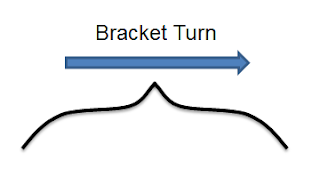Like three turns, choctaws, and mohawks, brackets gets its name because it looks like something. In fact it looks like a typography bracket.
But there's an interesting etymology where the word 'bracket' came from. The first recorded instance was in a dictionary written by Captain John Smith of Pocohantas fame. The dictionary was titled, An Accidence, or the Pathway to Experience Necessary for all Young Seamen, written in 1626. (Sadly, it is not only no longer in print, and I can't find it scanned into Google Books.)
In his book he used the term 'bracket' to describe the supports in the interior of a ship.
If two 'brackets' were placed tip to tip inside the ship--a 'double bracket'--these would indeed present an outline that we know today as a 'curly bracket'.
However, where did the the word 'bracket' come from? It is an anglicization of the French word 'Braguette'. Braguette is a French word for a piece of armor that was thought by the English to resemble the Bracket. In French, the 'braguette' is the opening in the front of the armor (the fly) where the plates part to give the knight flexibility of the hips as he fights. However the English used the work 'braguette' to name the metal cover that protects the anatomy of the person wearing the armor.
Yes, a 'braguette' is a codpiece.
The French being terribly sensible, do not use the term 'braguette' in skating. They use the term 'accolade' from architecture.
 |
| Voila! Le accolade! |
I appreciate the information I got from 'The Inky Fool," by Mark Forsyth regarding codpieces. His books are available on Amazon. "Etymologicon" and "The Elements of Eloquence." I have both.




No comments:
Post a Comment